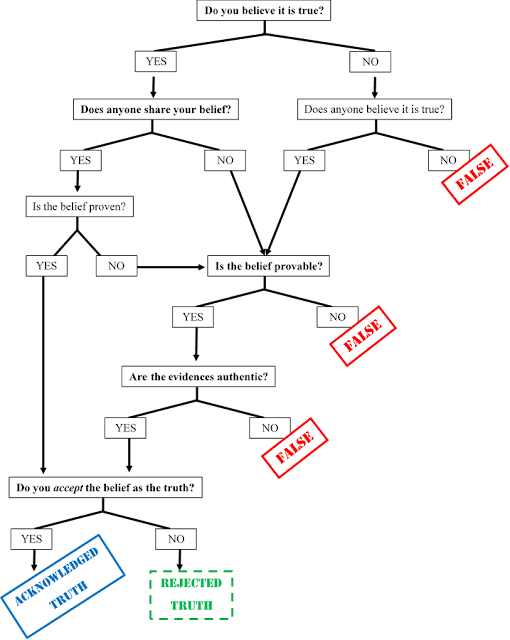Determining Truth
Develop your own personal criteria of TRUTH. Devise a series of questions that you will use in determining the truth of an idea, statements, or events.
1. Do you believe it is true?
It is crucial to believe that something is true for it be considered as the truth. The belief that something exists/existed, that something is real, or that something is true matters for determining the truth.
2. Does anyone share your belief?
If you’re the only person you know believing that belief, then it might be doubtful. If other people share your belief, then the chances are high for it to be considered as the truth. A general consensus of the shared belief has a higher chance to be deemed factual.
3. Is your belief provable?
It doesn’t matter whether it only happened in the past, is currently happening, or will hopefully happen. As long as you can prove it with enough and conclusive pieces of evidence, then it can be considered as truthful. Proving your belief must be practiced to prevent any skepticism from others.
4. Are your pieces of evidence authentic?
Genuine evidence is honest, accurate, and clear. It does not create such arguments. For it to be considered authentic, it must be free from error, and no doubts can possibly arise. This can only be achieved by providing real data.
5. Do you accept your belief as the truth?
Acceptance of the belief is imperative. Even if you believe something is true, something exists/existed, and something is real but you fail to accept it as the truth, then it may not be totally served as truthful for you.
These are my five major questions in determining the truth that can serve as my personal criteria on validating the truthfulness of an idea, statement, or event. A flowchart is created to better understand the series of questions I formulated.
My personal flowchart in determining truth:
Just because you believe something doesn’t necessarily mean you accept it. Believing is different from Acknowledging. We may believe things yet not fully acknowledge them. Paradoxically, we acknowledge things only when we believe them. After determining truth, I then classify them into two: Rejected Truth (Denialism) and Acknowledged Truth.
---
---
Performance Task in Introduction to Philosophy
August 13, 2018











Comments
Post a Comment